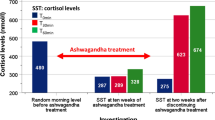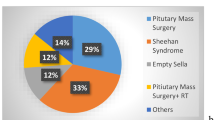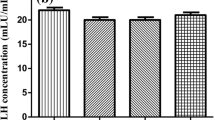Abstract
Glucocorticoids, the end-product of the hypothalamic-pituitary-adrenal (HPA) axis, suppress gonadotropin release by acting at the level of the pituitary gland. However, experimental evidence suggests that they may also act at the hypothalamic level to suppress gonadotropin-releasing hormone (GnRH) release. The lack of a direct demonstration of this assumption, prompted us to evaluate the effects of glucocorticoids on hypothalamic GnRH release from individually-incubated hemi-hypothalami explanted from male rats. Since testosterone (T), dihydrotestosterone (DHT), and progesterone suppress GnRH release and androgens potentiate the effects of glucocorticoids on GnRH release, we studied also the interaction of these steroids with glucocorticoids on GnRH release. Corticosterone (B), the main glucocorticoid of the rodents with greater affinity for the type I glucocorticoid receptor, and dexamethasone (DEX), a synthetic type II glucocorticoid receptor agonist, were able to suppress basal GnRH release in a concentration-dependent fashion. DEX induced a more profound suppression of GnRH release. Neither T (0.1 nM) nor DHT (0.01 nM) modulated the suppressive effects of low (10 nM) or high (100 nM) concentrations of B on GnRH release. On the other hand, progesterone counteracted the suppressive effect of low concentrations of B (10 nM) on GnRH release, but had no effect on the suppression caused by a higher concentration of B (100 nM). The ability of glucocorticoids to inhibit directly GnRH release suggests that these stress-responsive hormones act also at the hypothalamic level to suppress the reproductive function. The suppressive effect of B was not modulated by androgens, but it was neutralized by progesterone, al least when B was used at low concentrations. We speculate that this steroid “protects” the GnRH-secreting neuron only during basal, but not stress-induced, HPA axis activity when the concentrations of glucocorticoids are more elevated.
Similar content being viewed by others

References
Gray G.E., Smith E.R., Ehrenkranzt J.R., Davidson J.M. Neuroendocrine mechanisms mediating the suppression of circulating testosterone in male rats following chronic stress. Neuroendocrinology 1978, 25: 247–256.
Munck A., Guyre P., Holbrook N. Physiological functions of glucocorticoids in stress and their relationship to pharmacological actions. Endocr. Rev. 1984, 5: 25–44.
Sapolsky R., Krey L.C., McEwen B.S. The neuroendocrinology of stress and aging: The glucocorticoid cascade hypothesis. Endocr. Rev. 1986, 7: 284–301.
Dallman M.F., Darlington D., Suemaru S., Cascio C., Lavin N. Corticosteroids in homeostasis. Acta Physiol. Scand. 1989, 583: 27–34.
Fonda E.S., Rampacek G.B., Kraeling R.R. The effect of adrenocorticotropin or hydrocortisone on serum luteinizing hormone concentrations after adrenalectomy and/or ovariectomy in the prepubertal gilt. Endocrinology 1984, 114: 268–273.
Vreeburg J.T.M., de Greef W.J., Ooms M.P., van Wouw P., Weber R.F.A. Effects of adrenocorticotropin and corticosterone on the negative feedback action of testosterone in the adult male rat. Endocrinology 1984, 115: 977–983.
Mann D.R., Evans D., Edoimioya F., Kamel F., Butlerstein G.M. A detailed examination of the in vivo and in vitro effects of ACTH on gonadotropin secretion in the adult rat. Neuroendocrinology 1985, 40: 297–302.
Redei E., McGivern R.F. Adrenalectomy restores stress-induced inhibition of LH secretion in long-term ovariectomized female rats. 69th Ann. Meet. Endocr. Soc. Indianapolis, IN 1987. Abstract 480A.
Ringstrom S.J., Schwartz N.B. Cortisol suppresses the LH but not the FSH response to gonadotropin-releasing hormone after orchidectomy. Endocrinology 1985, 116: 472–474.
Chatterton Jr. R.T., Kazer R.R., Rebar R.W. Depletion of luteal phase serum progesterone during constant infusion of cortisol phosphate in the cynomolgus monkey. Fertil. Steril. 1991, 56: 547–554.
Rosen H., Jameel M.L., Barkan A.L. Dexamethasone suppresses gonadotropin-releasing hormone (GnRH) secretion and has direct pituitary effects in male rats: differential regulation of GnRH receptor and gonadotropin responses to GnRH. Endocrinology 1988, 122: 2873–2880.
Suter D.E., Schwartz N.B. Effects of glucocorticoids on secretion of luteinizing hormone and follicle-stimulating horrnone by female rat pituitary cells in vitro. Endocrinology 1985, 117: 849–854.
Suter D.E., Schwartz N.B. Effects of glucocorticoids on responsiveness of luteinizing hormone and follicle-stimulating hormone to gonadotropin-releasing hormone by male rat pituitary cells in vitro. Endocrinology 1985, 117: 855–859.
Soules M.R., Steiner R.A., Clifton D.K., Cohen N.L., Aksel S., Bremner W.J. Progesterone modulation of pulsatile luteinizing hormone secretion in normal women. J. Clin. Endocrinol. Metab. 1984, 58: 378–383.
Schaison G., Couzinet B. Steroid control of gonadotropin secretion. J. Ster. Biochem. Mol. Biol. 1991, 40: 417.
Calogero A.E., Weber R.F.A., D’Agata R. Effects of rat prolactin on gonadotropin-releasing hormone secretion by the explanted male rat hypothalamus. Neuroendocrinology 1993, 57: 152–158.
Dubey A.K., Plant T.M. A suppression of gonadotropin secretion by cortisol in castrated male rhesus monkeys (Macaca mulatta) mediated by the interruption of hypothalamic gonadotropin-releasing hormone release. Biol. Reprod. 1985, 33: 423–431.
Ahima R.S., Harlan R.E. Glucocorticoid receptors in LHRH neurons. Neuroendocrinology 1992, 56: 845–850.
Radovick S., Wondisford F.E., Cutler G.B. Isolation of the human gonadotropin releasing hormone (GnRH) gene: Analysis of gene structure in isolated hypogonadotropic hypogonadism. Endocrinology 1988, 122 (Suppl. 1): 68.
Chandran U.R., Attardi B., Friedman R., Dong K., Roberts J.L., DeFranco D.B. Glucocorticoid receptor-mediated repression of gonadotropin-releasing hormone promoter activity in GTl hypothalamic cell lines. Endocrinology 1994, 34: 1467–1474.
Spencer R.L., Young E.A., Choo P.H., McEwen D.S. Adrenal steroid type I and type II receptor binding: Estimates of in vivo receptor number, occupancy, and activation with varying level of steroid. Brain Res. 1990, 514: 37–48.
Baldwin D.M. The effects of glucocorticoids on estrogen-dependent luteinizing hormone release in the ovariectomized rat and on gonadotropin secretion in the intact female rat. Endocrinology 1979, 105: 120–128.
Briski K.P., Sylvester P.W. Antagonism of type 2, but not type 1 glucocorticoid receptors results in elevated basal luteinizing hormone release in male rats. Neuroendocrinology 1994, 60: 601–608.
Plant T.M. Gonadal regulation of hypothalamic gonadotropinreleasing hormone release in primates. Endocr. Rev. 1986, 7: 75–88.
Kamel F., Kubajak C.L. Modulation of gonadotropin secretion by corticosterone: interaction with gonadal steroids and mechanism of action. Endocrinology 1987, 21: 561–568.
Chou Y.C., Luttge W.G. Activated type II receptors in the brain cannot rebind glucocorticoids: Relationship to progesterone’s antiglucocorticoid action. Brain Res. 1980, 440: 67–78.
Svec F., Teubner V., Tate D. Location of the second steroid-binding site on the glucocorticoid receptor. Endocrinology 1989, 125: 3103–3108.
Ramirez V., Dluzen D., Lin D. Progesterone administration in vivo stimulates release of luteinizing hormone-releasing hormone in vitro. Science 1980, 208: 1037.
Peduto J.C., Mahesh V.B. Effects of progesterone on hypothalamic and plasma LHRH. Neuroendocrinology 1985, 40: 238–245.
Author information
Authors and Affiliations
Corresponding author
Rights and permissions
About this article
Cite this article
Calogero, A.E., Burrello, N., Bosboom, A.M.J. et al. Glucocorticoids inhibit gonadotropin-releasing hormone by acting directly at the hypothalamic level. J Endocrinol Invest 22, 666–670 (1999). https://doi.org/10.1007/BF03343627
Accepted:
Published:
Issue Date:
DOI: https://doi.org/10.1007/BF03343627



